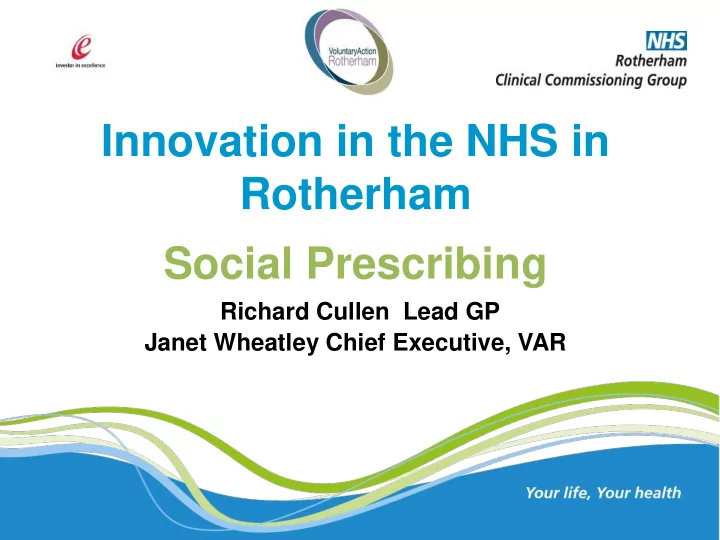

Innovation in the NHS in Rotherham Social Prescribing Richard Cullen Lead GP Janet Wheatley Chief Executive, VAR
The NHS Challenge • Huge efficiency challenge - £70m over 4 years • Increasing numbers with long term conditions • Above average unplanned hospital admissions • Shift of focus to prevention and early intervention • Recognition that patients need support with non-medical issues • “More of the same” is not an option
• The challenge for GPs………………… • How do we make you feel better?
“Life Makes you Feel Unwell”
Our Solution Social Prescribing Case Managed by GP’s
The Leap of Faith….. • Voluntary sector challenged to reduce admissions to hospital • Open thinking by commissioners prepared to take a risk
Why Work in Partnership With Voluntary Action Rotherham? • Track record and relationship with CCG • Conduit to wider Voluntary and Community Sector • One contract/accountable body • Added value/ripple effect
How Are Patients Selected For The Service? • Risk Stratification identifies top 3% of patients at risk of hospitalisation • 3-5% identified using risk stratification and GP Clinical Judgement
MDT GPS, PRACTICE NURSES, DISTRICT NURSES/COMMUNITY MATRONS, SOCIAL WORKER AND VAR WORKER
Social Prescribing Strengthening individuals, strengthening communities Provides a framework for: 1. Connecting people with long term conditions, referred through case management teams, to sources of support in their community 2. Linking a Voluntary Sector Advisor to each practice to support the GP and primary care team to find community activities that meet patient needs 3. Rotherham SPS started April 2012 first referrals September 2012 4. Extended to a pilot project working with RDASH mental health teams. Pilot started 1 st April 2015
Rotherham Social Prescribing Model Integrated LTC Case Management Team Feedback Patient is on risk tool Patient has non- medical needs Voluntary and Community Sector Advisor (VCSA) Assessment Feedback Menu of options Funded VCS Community Activity Service (non-funded)
Social Prescribing - Process Measures referrals to services 3997 referrals in to SPS 6184 referrals out to VCS services Fire Safety Assessment Rehabilitation services… (4822 to commissioned services Library services (Home… Assistive Technology 1362 to non commissioned Carers Assessment Community Activity -… services) Home Exercise 1604 referrals out to non-VCS Information and Advice -… 24/7 Community Alarm 2171 signposts Community Exercise… Counselling 35 GP practices Social Care Assessment Information and advice -… Highest referring GP Practice – Fire Safety Assessment Community Activity -… 416 referrals Dementia Support Worker… 51% aged 80+ Advocacy Carer Respite 12.5% aged under 60 Enabling (one to one… Complementary Therapies… 4% BME OT assessment Community Link Worker… Community Transport Befriending at home Information and Advice -… Community Activity -… 0 500 1000 1500
Key Learning Points The need for key contacts, building and maintaining relationships and champions – get the CCG, GP’s and VCS on board Be in the right place, right time, with the right idea, pitched to the right people Leap of faith – the importance of time and scale Role of lead bodies – implications for contracting and micro- commissioning Support the VCS groups/ organisations as well as the patients The need for dedicated co-ordinated staff who are integral to the team Be prepared to be challenged and to challenge professional boundaries The vital role of KPI’s and quantative as well as qualitative independent evidence to argue the case
Conclusion There continues to be positive signs of impact on emergency admissions / A&E attendances with marked changes for those under 80 and those who use this intervention as a kick start to continued support and involvement with the VCS Translates into cost reductions for commissioners: Health & Social Care Also broader outcomes such as patient experience and satisfaction with care, and the potential social and residential care reductions Non-economic value: improvements in the health and well-being of local people; more engaged communities; more sustainable and vibrant VCS – We estimate in the last few months approximately £ 1.5m brought into the sector Continued and growing National Reputation and interest in Social Prescribing and role of the VCS in the emerging health economy
It is a win/win!! The CCG benefits, as it addresses inappropriate admissions. The GP’s benefit, as it gives them a third option other from referral to hospital or to prescribe medication. The Voluntary and community sector benefit, as it supports their sustainability. And most importantly - the Patient and Carers love it as it improves quality of life, reduces social isolation and moves the patient from dependence to independence.
The Future • The service is no longer a pilot and is recurrently funded through the Rotherham Better Care Fund. • The CCG have commissioned an expansion into helping those patients that are stable long term psychiatric patients to re-enable them to leave mental health services
Recommend
More recommend